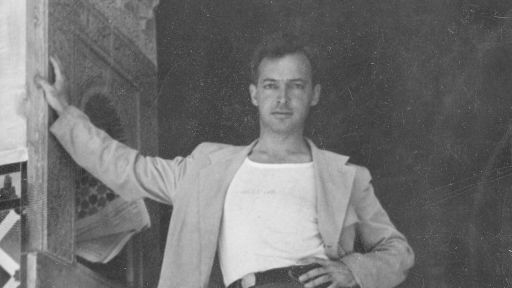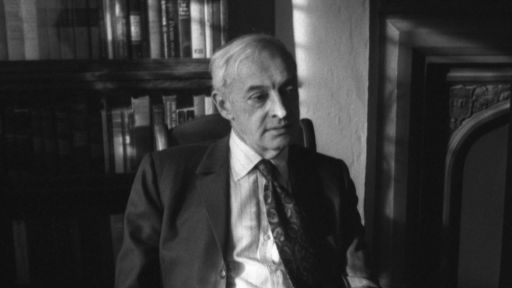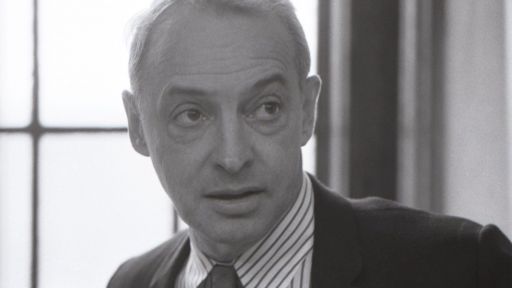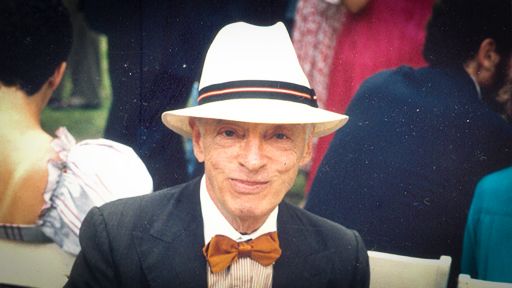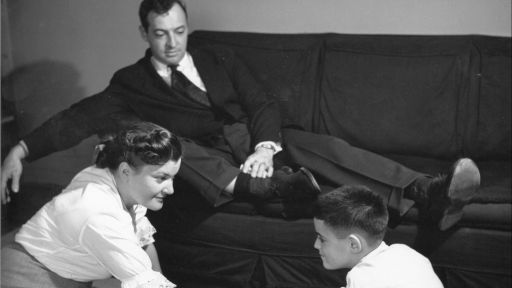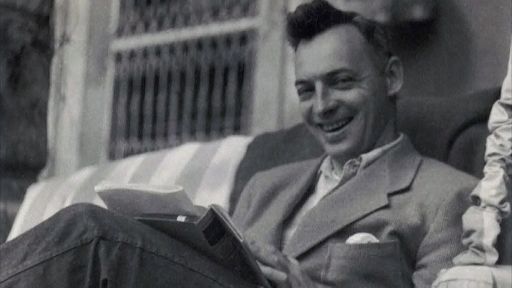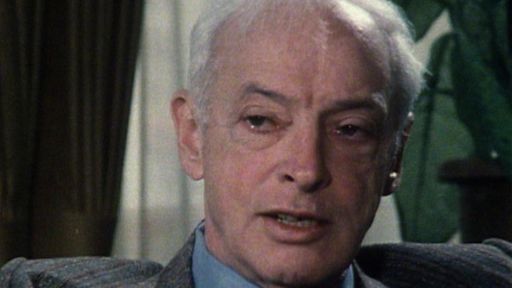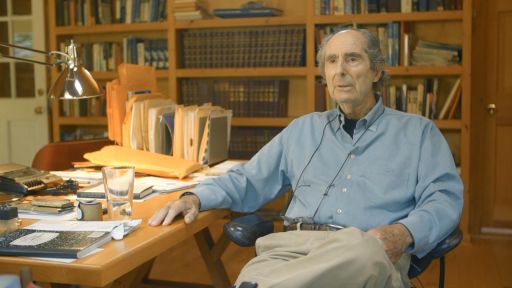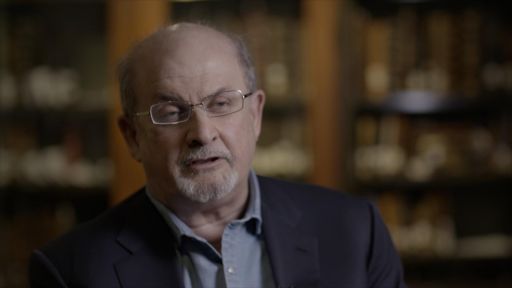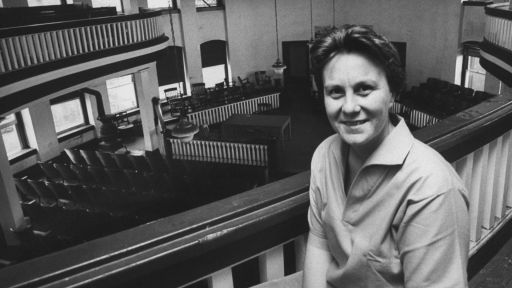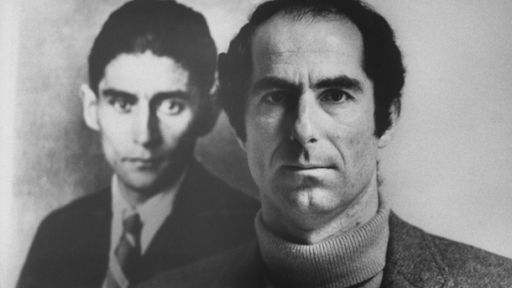TRANSCRIPT
♪♪ ♪♪ -♪ After the lights go down low ♪ ♪ Baby, you know ♪ -I love that portrait of the streets, and Bellow used the city as a character, almost.
When he talks about being a Columbus of the near at hand, you know, that's that idea that you're exploring not distant lands, but the world that's immediately around you, and that's just as big an exploration.
I found that very inspiring, I suppose, as a young writer.
♪♪ -♪ I want to hold you ♪ ♪ Squeeze you as tight as I can ♪ -I believe that any aspiring writer or reader will have to stop at the books of Saul Bellow at some point.
He's one of the most elegant prose stylists you could ever expect to read, but even more than that, he will challenge your thinking.
-♪ When the lights go down low ♪ ♪ Unh-unh, baby... ♪ -There's no Bellow book that didn't shake me when I read it.
He certainly gave me a sense of the capaciousness of fiction, of everything you could do, that you could do anything, really.
You made the standard yourself.
You made the aesthetic yourself, that there were no rules.
♪♪ ♪ After the lights go down low ♪ ♪♪ -For most of his life, Saul Bellow was the most acclaimed novelist in America.
When he was on his deathbed, he said, "Was I a man, or was I a jerk?"
Just a human being showing the best of human qualities, need have nothing to do with how many awards you'd got.
"Jerk" is a Bellow word.
It appears in lots of his stories.
You don't want to be a jerk.
♪♪ -♪ And I'll be needing you ♪ -He liked Chicago, and he liked it that we'd be walking down the street and people would recognize him.
But at a certain point and actually pretty quick, he wanted everybody to leave him alone so that he could do his work.
Even me -- he wanted me to leave him alone.
And he liked me better than most people.
♪♪ [ Insects chirping ] ♪♪ -Here we are.
♪♪ ♪♪ -Saul Bellow came here every morning after his coffee.
He would sit here at his desk, looking out at the Green Mountains, and write.
Sitting here and sweating -- he got very hot when he wrote -- he would strip down to his T-shirt.
It was laborious.
It wasn't just, "Oh, here I am having a little fun writing."
He would sort of make a whistling noise under his breath as he works, and he would labor over the sentences.
His head turned slightly to the side.
♪♪ It was magic to see.
♪♪ -"Terribly hard work was taking place.
Hard, hard work -- excavation and digging, mining, moling through tunnels, heaving, pushing, moving rock, working, working, working, working, working, panting, hauling, hoisting.
And none of this work is seen from the outside.
It's internally done.
It happens because you are powerless, and therefore in yourself you labor, you wage and combat, settle scores, remember insults.
Where is everybody?
Inside your breast and skin, the entire cast."
♪♪ "The Adventures of Augie March," which I think is the great American novel.
You say he writes with his brain, he writes with his heart.
Saul writes with his soul.
♪♪ ♪♪ ♪♪ -"I am an American, Chicago born -- Chicago, that somber city -- and go with things as I have taught myself, free-style, and will make the record in my own way: first to knock, first admitted; sometimes an innocent knock, sometimes a not so innocent."
-"I am an American, Chicago born."
That's when I've been stabbed.
I've been stabbed with America.
I've been stabbed with Chicago.
He didn't begin by saying, "I'm a Jewish child of immigrants."
He unloaded that.
He claimed his fundamental identification, which was to America.
♪♪ -Bellow was born in Lachine, Quebec, his two older brothers and older sister born in Saint Petersburg.
He grew up in a family in which Russian, Yiddish, and English were spoken.
He really didn't know what language he was speaking when he was growing up.
-It must have been important to me that at a very early age, like so many Jewish children, I began to read the Old Testament in Hebrew.
We were all taught from the age of 4.
Well, I didn't know whether these were stories or facts, and this puts one in a sort of magical sphere.
♪♪ -"I am an American, Chicago born."
Up to that point, it's straight Walt Whitman.
"Walt Whitman, a kosmos, of Manhattan the son," but the next line is, "First to knock, first admitted; sometimes an innocent knock, sometimes not so innocent."
That's the child of Jewish immigrants from Eastern Europe speaking.
That is Walt Whitman didn't have to knock on the door to get in.
♪♪ -Abraham, father of Saul, became a bootlegger on a small scale.
Agents of the revenue in Canada were after them, and finally, it was decided to get out of Montreal.
They were smuggled into the United States, and for a very long time, they lived in Chicago without proper citizenship.
♪♪ -The streets were freedom to us when I was a kid in Chicago.
Everything was happening, legitimate and illegitimate, on the streets.
They were filled with the babble of immigrants, full of hustle.
Well, as described in "Augie March."
-"Augie March" just changed my sense of what a novel could do, of what a Jewish writer could do with his experience, because up until then, there wasn't any Jewish writer who's comparable who was not in the public-relations business, was not busy honoring Jews or praising Jews or defending Jews.
He just presented Jews.
You know, that was very liberating.
♪♪ -You look like your uncle, Saul Bellow.
-[ Chuckles ] I got a haircut just for you yesterday, and I asked the barber to give me a haircut like my dear uncle, okay?
It's a good picture.
Saul's novels are so very, very largely autobiographical.
These books are centered on the protagonist, the Saul figure, and his counterpoint is the older brother.
And the older brother is obviously my father.
It's a guy who can't control his appetites, any of his appetites.
If the guy can't control any of his appetites, goodness knows, you know, what's gonna happen.
-Getting married now.
-What?
To whom?
-"To whom?"
To a woman with money.
-She's pretty?
-She's not bad.
I'll ask for a yard as a wedding present.
What's the matter?
-Do you like her?
-I barely know her.
What's the difference?
-But she said yes.
-I haven't asked her yet, but she will.
Don't worry about that.
-What makes you think that this girl and her family want you?
-They'll get full value out of me, those people.
I won't lie down and take it easy.
I can't.
I want money, and I mean want.
-He used his older brother, Morrie, six times in his fiction.
He was obviously filled to sky for Saul when he was a child and was a very vivid character.
He had 300 pairs of shoes and as many suits, and he had a kind of suburban dukedom where he lived.
And he was American money, American materialism.
-The father was always upbraiding him for not entering into the business that he had started with his brothers.
His father and brothers disdained his literary ambitions.
They thought he was a schmuck with a pen.
"Augie March" is dedicated to his father, but his father is not a presence in the novel.
The parent who figures prominently in the novel is his mother, and she has a feeling and spiritual side that Augie inherits.
♪♪ -I think American writers have always felt a very particular obligation to supply a morality.
-Why?
-That if they didn't do it, the businessmen would, and then all hell would break loose.
♪♪ ♪♪ -This is a picture of my mother and father on a street corner in 1937.
According to my father, they were having a very intense political argument.
My parents were both left-wing.
They were both Trotskyites, and it is just about the time they got married.
This picture really captures something of the passion between the two of them.
♪♪ -They look very happy.
-They were happy at the beginning.
They were very happy at the beginning.
He went off to the university to study anthropology, and his anthropology professor told him that all his papers were like short stories and he should give up anthropology.
One of the nicest things about my mother, she was a great facilitator.
She worked, and they were married for 15 years.
She worked so he could write.
Well, that, of course, applied to him, but it was very much part of her character.
Somebody who said, "Follow your dreams."
♪♪ -Riding the elevated trains in Chicago between Humboldt Park and Hyde Park took an hour and a half.
You were on these racketing, speeding, skimpy trains, which looked as if they were gonna be derailed any minute.
Passing through the slums, you could look into the bedrooms, you could look into the yards and see all kinds of horrors there, too, comedies of that labor.
And you were reading books.
What these books have to do with the Chicago landscape that you were speeding through it on your way to the university, where I was signed up for Economics 201 and I was reading Joseph Conrad instead because Conrad meant more to me humanly well, and then I would find myself doing the odd thing, that is to say I would read one of those marvelous paragraphs, and then I would take it apart to see if I could put it together better because I wanted to get to the secret of this verbal organization.
Sometimes I thought I could make a little improvement.
Mostly, I couldn't.
But it was a most fascinating occupation.
It involved me totally.
I'm all for that.
It doesn't mean that I was unaware of Chicago speeding by.
♪♪ The year was 1937.
It was the heart of the Depression.
I went to see Mr. Briand, who was the chairman of the English department at Northwestern, and he said, "You've got a very good record here at the university, but I wouldn't recommend that you study English literature.
You weren't born to it."
-"I am an American, Chicago born."
Of course, he was not.
What he was really saying is, "I'm an American writer, Chicago born, and you're gonna have to deal with me."
♪♪ -He developed a prose style that allowed him to give voice to a segment of the American population that hadn't previously been heard in high culture.
Augie has interests in philosophy and politics and literature, but he knows also about gambling and street life and scabs and baseball and so forth.
-He could glide the Bellowvian glide.
He could glide from the street demotic language to the elegant language to the philosophical language.
♪♪ -"Not that I can see my big, gentle, dilapidated scrubbing and lugging mother as a fugitive of immense beauty from such classy wrath."
"Wrath" is the language of the Bible.
The gods express wrath.
"Classy" is a word that people who know they are high-class never use.
♪♪ Bellow is not afraid of hybridity.
Bellow celebrates hybridity, and it's the clash of register and tone that makes this innovative writing.
♪♪ -Well, I think it's characteristic of American literature altogether that it speaks with the voice of the American people, transposes that voice into something literary.
This is the discovery made by Mark Twain in "Huckleberry Finn," that is to say to take the spoken language, the language of the streets, and to blend it with another kind of thing to make literature of it.
♪♪ -"Augie March" was a very important novel at the moment that it came out because it reinvented the American novel in a certain way.
♪♪ -What he did is he blew the lid off of the sentence.
The lid had been put on by Hemingway.
Hemingway was the reigning master of the American sentence.
Hemingway had stripped away all the stuffing that had gotten into the American sentence in the 19th Century and got down to the bare Shaker-like beauty of a declarative sentence, and his motto was, "Don't think about it."
He lived off the surface of things, and Bellow's motto was, "Think about it."
And so these sentences were full not just of description, not just of verbal energy, but of mentalness, experience, and consciousness.
That enriches the sentence, you know?
And this was a great shift in the American notion of what a great prose style was.
-In this scene, you obviously are madly in love with this woman, and she has this pet eagle.
-Yeah.
[ Laughter ] -And Thea seems to be obsessed about this pet eagle, and you want to do everything possible to have her be happy.
-Happy eagle, happy wife, happy life.
-Exactly.
Exactly.
Exactly.
-The bird?
-Yes, the bird.
[ Chuckles ] What if he's hopeless?
-What if he is?
We'll figure out some other way to make money.
I'll figure it out.
-It's not the money, Augie.
My God.
Don't you understand that?
-I'd like him to drop dead, but I see the other side of it, too, how it fills you with this brilliant energy.
That's what I love.
-I want it to fill you, too.
-I don't need him to love you.
-But don't you get it?
Love isn't the end.
It's the avenue.
-To what?
-To the thing.
Whatever you choose it to be, the necessary thing.
There's a kind of action that love makes you ready for and sets you free to do.
-You worry about me, too, whether I can make the move from love... to the next step.
♪♪ -This is the picture of my mother and my father and I, and even though they look rather amiable, they are about this close to being divorced.
My father once said, "You know, your mother brought out the worst in me."
I think the questions of freedom were perplexing him.
You see it in "Augie March."
That's what I think he meant by, "Your mother brought out the worst in me," because she was kind of rigid.
-They were fighting a lot?
-Oh, like crazy, yeah.
-About what?
-He wanted to go.
She wanted him to stay -- very simple.
My mother was trying to hold on to the marriage.
She loved my father very much.
She had a very hard time.
She was alone for 10 years after they got divorced.
He said something in late life about feeling he shouldn't have divorced her, but I thought he was crazy.
-This is what he felt.
-I know that, but he has to also take into account that he wrote five or six novels about his other marital failures, which he wouldn't have had if he'd stayed married to her.
It's illogical.
♪♪ -This is the library where all of Saul's books live.
♪♪ In this corner here, this is Yiddish and Hebrew literature.
This is the Greek and Latin section.
He could read "Don Quixote" in Spanish.
He was fluent in French, very widely read in history, philosophy, poetry, literature of all kinds.
♪♪ ♪♪ ♪♪ [ Record crackles ] -"If I am out of my mind, it's alright with me," thought Moses Herzog.
Some people thought he was cracked, and for a time, he himself had doubted that he was all there.
He had fallen under a spell and was writing letters to everyone under the sun.
He wrote endlessly, fanatically, to the newspapers, to people in public life, to friends and relatives, and at last, to the dead -- his own obscure dead and finally, the famous dead.
He was taking a turn around the empty house and saw the shadow of his face in a gray webby window.
He looked weirdly tranquil.
A radiant line went from mid-forehead over his straight nose and full, silent lips.
He took a new sheet of paper and wrote..." -He's saying that he shouldn't have married my mother.
[ Laughs ] I beg to differ.
[ Laughs ] ♪♪ -"Herzog" was published in 1964, and at its heart is this episode of betrayal on the part of Bellow's supposed close friend and his second wife, Sasha, Sondra, who becomes Madeleine in the story.
The novel is an account of his coming to health after a breakdown occasioned by this betrayal.
♪♪ -This chair that you can see behind me is the, I think, the last relic of my parents' marriage.
It's a chair that they bought on their honeymoon in Mexico.
I guess it was 1955.
On the day that she left him, he was sitting in this chair reading a book by Kirkegaard, a gloomy philosophical book, and she informed him that she was leaving and walked out with me on her hip, got in the car, and drove away.
[ Engine starts ] [ Vehicle departs ] -The character of Moses Herzog is a scholar.
He's an academic.
He's devoting his research to a book about the failings of Romanticism, and he fails to complete that book.
As he writes about that, he can't sustain this solitude, so he writes letters to living people and to the dead.
-He writes letters to President Eisenhower, General de Gaulle, Bikenstein.
I forget who else he writes letters to, and in those letters, he packs his thinking.
And so the narrative doesn't stop.
The narrative is propelled by the rage to communicate that's in Herzog, the hero.
Okay.
"...Moses Herzog."
-It's really hard to do, you know, really hard to have... you know, a kind of metaphysical argument in the middle of a novel, and then he's one of the few writers, I think, who's successfully done that.
-Nietzsche says God is dead.
Herzog says death is God.
Whom do you stand with?
-I think Herzog is out of his mind.
[ Both laugh ] If your wife leaves you, do you start pulling Spinoza and Hagel off the shelf to find out why she did it or what you should do now?
Where are you gonna find the text for this?
So in a way, it really is a sort of a comic comment on our devotion to theory.
♪♪ -The essential comic premise in all of his novels, particularly "Herzog," is that here is a man with a PhD and a doctorate who has written books about romanticism, and yet he cannot manage his own love life.
♪♪ -"Herzog" was an enormous bestseller -- sold over 140,000 copies in hardback and was on the bestseller list for 42 weeks.
It displatted John le Carré's novel as number one on the best-seller list, and yet it's highly intellectual and full of arcane references.
I think it might have helped that Herzog comes to the conclusion that his elaborate and expensive education won't help him at all to solve such personal problems as the disaffection of his wife.
Nothing you'll read in Spinoza will help you with that.
-"The water stormed from the faucet, and Herzog watched as Madeleine transformed herself into an older woman.
She had a job at Fordham, and the first requirement to her mind was to look sober and mature.
Whatever she did, it was with unhesitating speed and efficiency, headlong, but with the confidence of an expert.
Engravers, pastry cooks, acrobats on the trapeze worked in this manner.
He thought she was too reckless at it, going too fast, about to have a spill, but that never happened.
First, she spread a layer of cream on her cheeks, rubbing it into her straight nose, her childish chin, and soft throat.
Despite the soft rings of feminine flesh, there was already something discernibly dictatorial about that extended throat.
She would not let Herzog caress her face downward.
It was bad for the muscles.
Seated, watching on the edge of the luxurious tub, he put on his pants, tucked in his shirt.
She took no notice of him; she was trying in some way to be rid of him as her daytime life began."
♪♪ I grew up thinking of this book as that awful book about my mother.
Anybody who ever read the book who met her would say, "Oh, you're Madeleine.
I know all about you."
It was a torment for her, you know, to be portrayed in that very sort of negative, angry way and by a great writer who could really capture you in such a way that anybody walking down the street could, you know, who had read the book be able to recognize you.
-I don't like to write from a flat, cold position.
You must either like the people -- either like them or hate them.
You can't be indifferent.
-If the question of abuse of trust... does come up, then it comes up with the ex-wives.
An uncomfortable fact, I think.
-I talked to my mother about the portrait of her in the book, and then I said to her, "You know, you don't get a sense from reading this book that there was ever any affection or love between the two of you.
What was it like when you first met?
Why did you -- You know, why did you marry him?"
And she said, "Oh, well, you know, here's the story.
I was a young woman.
He was a lot older.
People thought he was important, but I didn't quite see it.
But I kept him at arm's length."
And then she said, "You know, one day I was -- I was going down the steps of the subway and I tripped, and I turned my ankle and I had to spend a few days in bed.
And he came to see me every day, and he read to me from 'The Adventures of Augie March.'
He read me the whole thing, and I fell in love with him."
[ Laughs ] ♪♪ ♪♪ ♪♪ -I had applied only to one place for graduate work.
It was the University of Chicago's Committee on Social Thought.
I believe I had my 21st birthday that September.
My first glimpse of Saul would have been sitting at a seminar table, and all of us were a little bit anxious.
The great man was coming in, and I felt I didn't even want to look at him throughout the entire class.
But I did notice he had kind of exquisite hands.
Saul spoke in full sentences.
He was like something out of a book.
I listened to everything he said, and I watched his hands.
♪♪ ♪♪ "In the silence, Mr. Sammler drew down his tinted spectacles, seeing this person with his effective eye."
"Sammler later thought that voices had been raised on his side, but no one really tried to defend him.
Most of the young people seemed to be against him."
-I know where the most effective way of change is, and it isn't in the academy and it isn't behind an easel and it isn't in theater.
What we're talking about has to do with a whole system of values that have got to be turned over.
-He did have what I would call a bad reaction to the 1960s, and he reflected this in his writing and most famously in "Mr. Sammler's Planet."
-Well, I think that a great many writers have associated themselves with the youth and with the revolution and with these feelings.
Um...
But that was at an earlier moment.
Now the young don't have very much use for them or even for literature, and they are in a highly anti-cultural mood.
They've gotten hold of the idea of the Cultural Revolution, which, as far as I can see, consists in not reading and in destroying books, libraries, and other cultural property.
♪♪ -All the books he wrote were about somebody like himself, and when he came to "Mr. Sammler's Planet," he chose someone much older and someone who was European because he has seen the world collapse once.
-[ Speaking German ] -My father lived through the 1930s and the upheavals of the German universities where the Nazi movement was born, and there was kind of a feeling that an outbreak of barbarism and savagery could explode out of the university system in America.
They thought, "Well, this is going to happen again.
It's all gonna happen again."
♪♪ -At the center of "Mr. Sammler's Planet" is a Polish intellectual survivor of the Holocaust who is witness to the activities of a criminal, a black pickpocket.
Very elegant figure -- princely figure he's called, who picks the pockets of elderly... often Jewish riders on the bus.
-I really want you to hear this.
If you don't know this passage, this is one of the most controversial passages in the work of Mr. Bellow.
"'What is the matter?
What do you want?'
said Mr. Sammler.
He was never to hear the black man's voice."
"The pickpocket unbuttoned himself.
Sammler heard the zipper descend, then the smoked glasses were removed from Sammler's face and dropped on the table.
He was directed silently to look downward.
The black man had opened his fly and taken out his penis.
It was displayed to Sammler with great oval testicles, a large tan and purple uncircumcised thing.
A tube, a snake.
Metallic hairs bristled at the thick base, and the tip curled beyond the supporting demonstrating hand, suggesting the fleshy mobility of an elephant's trunk, though the skin was somewhat iridescent rather than thick or rough.
The thing was shown with mystifying certitude.
Lordliness.
Then it was returned to the trousers.
Sammler was released."
Um... What do you think of that passage?
That is a remarkably... strange way of describing... the racial other, and the racial other is presenting his member in a way that's menacing, in a way that is supposed to be overwhelming Sammler, right?
This is unfortunately racist.
And so what this passage represents is a kind of white fear of the racial other.
♪♪ ♪♪ -I've been identified with all kinds of racism.
It's all too easy.
What I have strong feelings about is the invasion of every human being to the depths of his soul by a kind of violence and the admiration of the cult of extremism.
I fear it.
-You are gathered here this afternoon to hear the honorable Elijah Muhammad's message, which you knew in advance was titled "Separation or Death."
[ Cheers and applause ] -What I most fear is separatism.
"These are white man's laws.
We don't have to obey them.
We are a different people.
We have a different culture.
You don't understand this.
We don't want to assimilate ourselves."
-The black guy who was a robber on the bus, to show them his penis is more about Roy Jones and the people who were around at that time and what became known later as blaxploitation, where the people promoted stereotypes in so-called revolutionary black art because they felt that the idea of nonviolence was actually an Uncle Tom proposition.
♪♪ [ Indistinct shouting ] [ Whistle blowing ] -I have never seen, even in Mississippi and Alabama, mobs as hostile and as hate-filled as I've seen in Chicago.
It's definitely a closed society, and we're gonna make it an open society.
-...up a little bit.
-And we feel that we have to do it this way in order to bring the evil out into the open.
[ Whistle blowing ] ♪♪ -We have never known any minority group of people in this society itself who actually changed the majority opinion of people the way Martin Luther King did in the nonviolent civil-rights movement, and see, Bellow always knew that.
♪♪ -Bellow creates for Sammler a daughter, and the daughter's ex-husband is an Israeli.
The pickpocket is spotted by Sammler, and Eisen, the ex-son-in-law, appears on the scene.
And he attacks the black pickpocket.
-"'You said, Father-in-law!'
They quarreled in Russian before the crowd.
'You said I had to do something.
You said you have to go, I must do something, so I did.'
'I didn't say to hit him with these damned irons.
I didn't say to hit him at all.
You're crazy, Eisen, crazy enough to murder him.'
The pickpocket had tried to brace himself on his elbows.
His body now rested on his doubled arms.
He bled thickly on the asphalt."
♪♪ -What happens to the black pickpocket elicits our sympathy, provides a point of contact between the victimizing of Jews and the victimizing of blacks.
[ Whistle blowing ] ♪♪ -That's an interesting reading, and maybe Bellow's intention, to show compassion because Sammler is trying to end this, this vicious attack on this black character.
To be honest about it, I don't know.
[ Indistinct shouting ] [ Birds chirping ] ♪♪ -For Bellow, being human is the big question.
We have sentimental, melodramatic plots with people who think they're going to shoot other people, but in the end, they don't, and yet also introspection that has to do with the big question -- what is the right way to behave?
♪♪ ♪♪ ♪♪ -So this is part of a loop we used to do on our bikes.
We're gonna come to the right-hand turn, and the whole thing would loop around back to where we started from.
And it would take a couple of hours to do that ride.
♪♪ He took up mountain biking at... the nice age of 70-something.
♪♪ He said his internal age was 17.
♪♪ He behaved like he was 17.
♪♪ ♪♪ -"This woman, the mother of my children, though she made so much trouble for me, often reminded me of something Samuel Johnson said about pretty ladies: They might be foolish, they might be wicked.
But beauty was of itself very estimable.
Denise was in this way estimable."
My mother was Susan Bellow.
She was the third of my father's wives.
She was really smart.
She was beautiful, altogether magnificent person, which is why my father liked her in the first place.
They met when she came to a reading as the date of Philip Roth, who was another very fine writer and more my mother's age.
My mother's, I guess, 18 years younger than my father, and I'm very sorry that my father stole his girlfriend.
But if he hadn't, I wouldn't be here, so it's just one of these things that we have to accept in life.
♪♪ They were married in 1961, and I was born in 1964.
And things went downhill quick between them.
"'Oh,' I said.
'She may think she's offering me the blessings of an American marriage.
Real Americans are supposed to suffer with their wives and wives with husbands, like Mr. and Mrs. Abraham Lincoln.
It's the classic U.S. grief, and a child of immigrants like me ought to be grateful.
For a Jew, it's a step up."
♪♪ He liked to have a lot of ladies.
My mother caught him at it with the phone bill.
She said, "Who is Margaret Staats?"
And he said, "I don't want to discuss Margaret Staats with you."
That was pretty much it.
♪♪ ♪♪ -"For my dear friend Maggie in his literary (and other) judgments, I have absolute faith.
Love, Saul."
-"Humboldt's Gift" is about two writers -- Humboldt himself, who had a brilliant first book of poems published and then found himself sucked down into depressions, and Charlie Citrine, who is the main protagonist of the book.
He's moderately successful.
He teaches in Chicago, and he's attached to Humboldt.
-"I knew that Humboldt would die soon because I had seen him on the street two months before, and he had death all over him.
He didn't see me.
He was gray, stout, sick, dusty.
He had bought a pretzel stick and was eating it.
His lunch."
I can tell you about the pretzel, particularly.
We were on one side of 44th, let's say, and Delmore was walking across on the other side.
And he sort of staggered across the street, and he was eating a large pretzel and he was very distracted.
He was very disheveled, and it was very sad.
Saul was so taken aback.
There was a friend, and a friend he couldn't reach out to.
Delmore was beyond any help at that point, and we sat there on a bench and he told me the entire story of Delmore from beginning to end, all of it.
I would say we were there at least two hours.
It was very moving.
It was about friendship.
And it just happened to be the inspiration for a book.
♪♪ -Delmore Schwartz was born in 1913 in New York and was appraised by T.S.
Eliot as the poet of his generation, this amazing, sudden, precocious recognition, but Delmore also became a symbol of the artist in America who's doomed by the pressures of capitalism and has to be crazy because he's a poet.
♪♪ -People like that have no proper place in American life.
They just don't.
And this is a high-tech, high-finance, rationally organized kind of society in which people normally don't have such motives as Humboldt had.
They just don't.
He himself looks upon himself as an alien object because he is aware that he does not guide his life by the standards that prevail.
♪♪ But in his saner moments, I would have thought that he would say that art was something that life couldn't do without... and there was not this sort of divorce at all but that... ...art was one of the powers that made life life.
I think we all believe that.
I think I still do.
♪♪ -That's the engagement ring that he bought for me in Chicago, surrounded by 13 diamonds, and I used to think, "This is not a lucky sign."
But it's a lovely ring.
-You managed to be his girlfriend for a long time.
How did you do it?
-I did it by not marrying him.
♪♪ -My father left maybe a couple of months short of my 3rd birthday, and they fought forever in the courts of Cook County so that it became a scandal even in the courts of Cook County how long Bellow v. Bellow was taking to settle, which is all too bad, but over now.
-Putting it simply, if he didn't have so much money, would Denise be as ferocious with him?
-No, I'm sure that if he didn't have the money, Denise would not be, um, such a blood drinker.
But she is a blood drinker because he's got the money, and she's being extraordinarily vengeful.
But he's rather grateful to her because he thinks it's... it is liberating.
It wakes him up.
It's rousing, and he says to Thaxter, I think, if I remember correctly, "If she weren't suing me, I'd never get out of the house at all.
I owe it to her that I'm downtown, and look -- all these people now -- aren't they wonderful?"
[ Laughs ] -So my father writes this novel, and in the novel, there's this terrible ex-wife character, Denise, the purple-eyed castrating bitch, and everyone hates her and sympathizes with Charlie because Charlie's the hero.
And so what happens in "Humboldt's Gift" is just the world as Bellow liked to remake it.
It doesn't bear any relation to what actually happened between the two people, and there's no way to defend yourself against a literary portrait.
[ Marching band playing ] ♪♪ ♪♪ -In the early 1970s, I was one of that generation, the second wave of feminists, and I, as well as all many others, we began rereading our own literature.
"Will never understand what women want.
What do they want?
They eat green salad and drink human blood.
I now know the whole funny, nasty, perverted truth about Madeleine.
Much to think about.
He now had ended."
Yes, that's a famous line which many of us picked up on.
Right?
"They eat green salad and they drink human blood."
I wrote a long piece then of the way I have come to experience the writing by this very brilliant man who was in a constant state of grievance.
The beginning was Bellow and all the men who were born around 1915, they were all in love with America, and then the war comes and they wake up and suddenly have the right to be really enraged over having been marginalized by being Jewish in a Christian world.
It is completely open to them to say it like it is, and that grievance gives them all the vitality in the world.
It releases this astonishing brilliance of language, no holds barred.
Now, that grievance, in my view, becomes pathological.
Once assimilation began to make it less and less potent, they didn't know what to do with it, so they turned it on women.
Denise, Madeleine -- they are all doing me in, and of course, the culture was prodding it on.
It was the time.
[ Applause ] -You said somewhere in what sounded almost like a paraphrase of the famous Freud quote, "What does woman want?"
-He said he'd never been able to figure out what women really wanted.
Well, why should he have figured out what women wanted?
-Yeah.
And you might say which women?
-Yeah, that's right.
It's especially true about virtuous women.
That is to say, I've never turned over a fig leaf that didn't have a price tag on the other side.
[ Laughter ] -Who said that?
-Me.
-Oh.
[ Laughter ] -I was at a party a couple of weeks after that piece was published all those years ago in The Village Voice, and a woman came up to me and said to me, "I'm the second Mrs. Bellow -- the third Mrs. Bellow.
I want to shake your hand."
It was Susan Glassman.
[ Laughs ] -"Reactionary misogynist" is the label that's got itself attached to him.
It has nothing to do with literature, this idea of misogyny.
There have been many great misogynistic writers and misanthropic writers.
-The only thing I have to say about women is that my wish always was to make them happier than I found them, and...[Laughs] -Do you feel you've succeeded?
-Well, yes, I think, in a way.
Of course, I'm not a social-service agency.
That's not what the thing is about.
Um...
I think in "Humboldt's Gift," the poet says, or Charlie Citrine says about the poet... ...he wanted to do them good, but they wouldn't hold still for it.
[ Laughter ] -"From insult, Denise went into prophecy.
'Well, you wrote a few books.
You wrote a famous play, and even that was half ghosted.
You associated with people like Von Humboldt Fleisher.
You took it into your head that you were some kind of artist.
We know better, don't we?
And what you really want is to get rid of everybody, to tune out and be a law unto yourself.
Just you and your misunderstood heart, Charlie.
You couldn't bear a serious relationship, that's why you got rid of me and the children."
♪♪ There's a kind of brilliance to the way in which he's caricaturing his own male characters.
They're not just entirely meant to be taken seriously, and I think he has a kind of critical energy toward them.
And they are an examination and analysis of a kind of sadness, certain failure of intimacy and intimate connection, so it's not just a celebration of sheer male dominance.
It's also a critique on and a commentary on this kind of arrogant, dominant male.
♪♪ -In the second half of Bellow's life, he had made it.
He'd tasted everything that American material life could give you, but it wasn't enough.
He wanted something else, as Charlie Citrine searches for something else, something outside the material realm.
♪♪ ♪♪ ♪♪ -These are notes that I took from the Bellow seminars.
♪♪ I probably sat in on every single class from the beginning of the time I was there until 13 years later.
So everything I wrote down, including jokes and [laughs] funny moments -- it's all here.
♪♪ ♪♪ -My first meeting with Saul was memorable.
We met in this academic reception.
I said to him, "I'm sorry, I have not read any of your books.
I'm a mathematician."
His answer was, "Well, don't worry, I haven't read your books, either."
♪♪ I found him very seductive and very appealing, but in the meantime, I was beginning to hear stories about Saul and women and his previous marriages.
So it took a while before we started dating.
♪♪ Eventually, Saul moved in to this apartment.
♪♪ The moving day actually coincided with the day he was informed that he got the Nobel Prize.
[ Applause ] ♪♪ ♪♪ -Winning the Nobel Prize -- at first, it was very agreeable.
You wear a clawhammer coat and a white tie.
The king and the queen shake your hand.
You dine in a palace.
And you feel a little bit like Cinderella, but then 20 people burst into your bedroom with cameras in the morning before you've gotten out of bed or brushed your teeth or anything else.
And you realize that you're no longer your own master.
The only remedy is to hide from this, which is what I'm doing in Chicago.
♪♪ ♪♪ -A graceful old Hyde Park neighborhood.
It is the kind of place that attracted Mark Gromer and his wife, Crystal, both students at the University of Chicago, but that quiet life was disrupted before dawn today by the sound of crashing glass as Mark Gromer was pushed or perhaps fell to his death while attempting to stop two armed burglars who had entered his apartment.
Area One homicide detectives are searching for two teenage suspects.
A $5,000 reward has been offered to anyone who gives information leading to their arrest.
♪♪ -"The Dean's December" has some claims to be the most somber of Bellow's novels, in which Bellow fictionalizes a real-life murder that took place in July of 1977.
♪♪ Now, in the real-life story, an undergraduate at the University of Chicago worked in the same restaurant as the black person who was accused of the murder, and he was sure that man could not have committed a murder, that the circumstance was more and more complicated and that he was being railroaded, a not-uncommon phenomenon among police and judiciary in Chicago in the 1970s.
They wanted the case settled.
[ Siren wails ] ♪♪ [ Indistinct shouting ] -The story of what happened in 1977 was a story of madness.
It was a searing experience for me.
It tore me apart on many levels, but then Saul Bellow goes, takes this story, and writes it up, took me into the book as this student radical, Mason Zaehner in the book, the nephew of Albert Corde.
-The main character in Saul Bellow's new novel, "The Dean's December," is a journalist passing as a dean, and because Albert Corde is a better journalist than academic, he's in trouble for telling the truth.
-The Corde character in the book has gotten into a great deal of trouble at the university for having written tracts that are denouncing the corrupt brutality of Chicago, things that needed to be said.
♪♪ "Cities were moods, emotional states, for the most part collective distortions, where human beings thrived and suffered, where they invested their souls in pains and pleasures, taking these pleasures and pains as proofs of reality.
Thus 'Cain's city built with murder,' and other cities built with Mystery or Pride, all of them emotional conditions and great centers of delusion and bondage, death.
It seemed to Corde that he had made an effort to find out what Chicago, U.S.A., was built with.
So here was the emptiness before him, water -- and there was the filling of emptiness behind him, the slums."
♪♪ -"The Dean's December" was the book in which Saul introduced what used to be called the inner city into contemporary American fiction.
♪♪ Here was this American writer, a white man, a Jew, conservative or a neoconservative, call it what you want, who realized that this was a primary subject for American concern.
♪♪ -You can't live in Chicago without being sharply aware of the presence of this underclass, people saying, "We have to live this.
Why do we have to read it, too?
Isn't that enough?"
I think it's a question of what the power of imagination still might be in a condition like this and what the power of words might be.
♪♪ -"In the American moral crisis, the first requirement was to experience what was happening and to see what must be seen.
The facts were covered from our perception.
More than they had been in the past?
Yes.
The increase of theories and discourse, itself a cause of new, strange forms of blindness, the false representations of 'communication,' led to horrible distortions of public consciousness.
Therefore the first act of morality was to disinter the reality, retrieve reality, dig it out from the trash, represent it anew as art would represent it.
'This is your city -- this is your American democracy.
It's also my city.
I have a right to picture it as I see it.'"
Well, it seems to me everybody in America needs to read that passage right now.
'Cause seems to me that particular rant -- well, it's a classic, you know, Bellow rant -- is more valuable today than in the early '80s, when it was written.
[ Train bell ringing ] ♪♪ -When I'm really onto something, I'm in such a state of excitement that I feel that I'm galvanized by messages from all over the place, and I don't sleep well.
I'm up in the night.
Things pass through me.
I feel as though I were some sort of medium.
I'm unlivable with, my wife tells me.
You have to be very patient with me at a time like that.
♪♪ -He had so many facets to his personality.
He certainly had a very strong spiritual side.
Perhaps that was the reason why he was attracted to me when he learned I was a mathematician because of the spirituality of mathematics.
♪♪ Um...
The end of any marriage is a very sad affair.
It was actually a cold war, and the sciences were accused of having imperialistic tendencies, trying to take over the humanities.
He had gone through the experience of being married to an East European woman, to a mathematician, and he needed to move on.
That was my feeling.
♪♪ ♪♪ -Our second wedding, our Jewish wedding, was September 17th, but we were married -- our legal first wedding was here.
I can't remember how old I was.
27 or something like that.
♪♪ -"A la bella donna della mia mente.
To Janis, the star without whom I could not navigate.
And to the real Rosie."
♪♪ "I was grateful for the bay.
It gave us an enclosure.
I am thankful for boundaries.
I am fond of having the lines drawn around me.
I wasn't here to battle the seas but to swim and to float quietly.
To open my mind to Ravelstein.
Often Rosamund towed or carried me in water just shoulder-high.
She put her arms under me... [Voice breaking] ...and w--" ♪♪ Sorry.
♪♪ It was love.
I was very much in love with him, and I felt very lucky... to be with him.
I was overwhelmed at the beginning by this feeling of bliss, and he returned that, which was kind of astonishing.
He would read a George Herbert poem, "Can it be that I am he on whom thy tempest rained all night?"
He'd been through a lot, and he loved to play that up in a kind of Othello manner.
I don't think I knew at the time that that story had probably been told to many, many, many, many women over many, many years, but to me, it was the story of somebody who had been seeking his other half, and that was me.
The other half was me, so it had a very nice ending.
♪♪ [ Laughing ] We had a lot in common, strangely.
We felt lucky to be with one another, and the only thing that people thought strange was this gap in years.
But I don't think either of us ever felt it.
We were demonstrative.
We were laughing.
We were like a couple of kids.
♪♪ Everything for him was tied into writing.
When he was writing, all of his energies were on fire, and when he was having a good day at work, sky was the limit for him.
He was just young.
[ Chuckles ] ♪♪ -"Ravelstein" was the last of Bellow's novels.
It's a sort of fictional memoir of his friend and colleague at the Committee on Social Thought, the political philosopher Allan Bloom.
The novel's about love in that it's about how he loved this man Ravelstein, but it's also about the love that he and his fifth wife had for each other.
It makes for a rather moving novel and a terrific accomplishment for someone in his 80s.
-We had a memorable visit with Allan Bloom here.
♪♪ There was endless conversation, most of it in the kitchen, all day into much of the night, and Saul would have asked that question, "Hey, don't you want to go outside?
Don't you want to see some of my beautiful trees?
There's a 400-year-old maple.
There's a hickory in the yard that's beyond imagining."
"What do I need to go see trees?
I'm here to have a conversation with you."
That, of course, was Socrates.
There is no conversation with trees.
But there was endless laughing and joking and gossiping and deep, important things exchanged at that kitchen table.
♪♪ -Allan Bloom has written what is probably the most provocative book of the decade.
The subtitle of his book is "How Higher Education Has Failed Democracy and Impoverished the Souls of Today's Students."
The title of the book is "The Closing of the American Mind."
-Allan Bloom was a professor of philosophy who came to the University of Chicago from Cornell, where he was terrorized by demonstrating students and wrote a book that Bellow urged him to write.
It was on the bestseller list for a year, Heidegger and Rousseau aside, because it said what conservative people felt, which is that the country was being destroyed by radicals and radical students, especially.
-Ravelstein is an intellectual, a philosopher.
He's a man of the mind, but he cares about where he shops, how much he spends on his clothing, what brands he's wearing.
How these two things sit together -- this is what Bellow has done throughout his career.
But Ravelstein is bolder, louder, more colorful, and the irony here is that he's with a greater appetite for life just as he's dying.
[ Thunder rumbles ] ♪♪ -A significant part of Bloom's story was that he was gay, but being gay did not comport with being conservative.
In "Ravelstein," Bellow was the one who outed Bloom and acknowledged that he died of AIDS.
♪♪ -There were friends of Bellow's and of Alan Bloom's who broke off their relationship with Saul Bellow completely.
They felt that he had belittled him in some way.
♪♪ -Well, Saul had the realist's big staring, calculating eye.
He's an observer of what Saul called the near at hand.
There's no way he wasn't going to write about who he knew, what he knew about them, what he thought about them.
You can't be a novelist and manage your reputation at the same time.
You have to forget about managing your reputation.
The world will take care of it very nicely without you.
He could never leave the near at hand.
Why should he?
He was not a nice fellow.
-Well, I don't like to hurt anybody's feelings.
Um...
But I am involved with it myself up to here.
You know, and people are allowed to -- naturally, [Clears throat] their motto is... "Oh, I'm," you know, "I'm a decent person.
I'm for all the good things.
I'm against all the bad things.
Nobody's gonna hang a bad rap on me ever.
I'm open, I'm liberal, I'm friendly, I'm caring, I'm...
I am not a racist.
I'm a progressive."
You know, it's a highly organized form of self-congratulation.
Of course, you have to see through that... ...if you're writing fiction.
♪♪ -"...and it broke Ravelstein up to see Rosamund opening her purse and wrapping up the small, peaked chocolates covered with cocoa dust.
'Take 'em!
Take every last one,' said Ravelstein, the Jewish comedian.
What made Rosamund's scooping up of the truffles particularly appealing was that she was a very pretty, well-brought-up, mannerly, intelligent young woman.
It pleased him that she had fallen in love with an old guy like me.
'There's a class of women who naturally go for old men,' he said."
-How did you feel to be portrayed in "Ravelstein"?
-Oh, I didn't like it at all.
[ Laughs ] That's the simple answer, the plain truth.
When Saul began writing "Ravelstein," I had very much hoped I wouldn't be a part of the book.
When it looked like there's a little prissy character named Rosamund who was going to be based on me, I was not at all happy, and especially as the book got further and further along, I said, "Oh, for God's sake," you know, "just pull that little minor character out.
It would make me a lot happier if she wasn't there at all."
And I think I continued to feel that way but learned to keep my mouth shut because you don't talk to a writer about what he's doing in that way, and I just had to put up with it.
That's the way I saw it.
I didn't enjoy that.
♪♪ Saul was always the driver, by the way.
♪♪ I was always in the passenger seat.
In fact, to this day, when I come to my car, I go to the wrong side.
I try to get in on the passenger side because... he insisted on driving, even when it was no longer such a good idea.
♪♪ -We were sitting around a big, round table at this restaurant, laughing.
I had a wine bottle in front of me.
I poured myself, and I went to Janis' glass and she said, "No, I'm not drinking."
I said, "Alright, fine," and then they exchanged a look and Saul said, "You can tell him why."
And she said, "I'm pregnant."
And that produced the pause in the conversation.
Saul sat there very proudly and Janis, very happy and the rest of us startled.
-I am about to become a great-grandfather to my own child.
-Mm-hmm.
♪♪ -Well, that's a novelty, to say the least.
Maybe I could have some kind of special connection with this child.
♪♪ -When I visited him towards the end of his life, he took me upstairs, and at the top of the stairs, there were family pictures.
And he talked about the fact that he was looking forward to seeing them again.
♪♪ -I always liked that about him, that he had religious feelings, and I thought he wouldn't be Saul without that.
♪♪ -I don't know how you arrive at those mystical thoughts.
♪♪ I think it was life love... that made him say that.
He couldn't bear that this miracle could end.
♪♪ ♪♪ -Am I sorry life is so short?
Well, you come to terms with it, and you had better.
Americans have a strange sort of perennial youthfulness which prevents them from coming to terms with it, but I'm not all that American, probably.
[ Birds chirping ] [ Sufjan Stevens' "Saul Bellow" plays ] ♪♪ ♪♪ -[ Humming ] ♪♪ ♪♪ -Bellow is not read as often.
He has been found offensive, so he is read less, yes.
♪♪ -Writers are human beings.
We are not gods.
We are not omniscient.
Writers can have a lack of vision on a particular day, and on a different day, they might have perfect clarity.
♪♪ ♪♪ -All I know is the sentences on the page, and the points about those sentences is that they're adventurous and daring and they go into all kinds of new places and some risky places.
It's very...mold-breaking, adventurous writing.
♪♪ -I'm stamped with his presence.
I'm stamped with his prose.
I'm stamped with his influence.
He was a great conquistador, great liberator.
♪♪ ♪♪ ♪♪ -♪ And my good friends ♪ ♪ With their eyes on what it takes ♪ ♪ I could kiss them ♪ ♪ But the reeling's make mistakes ♪ ♪ Getting solid walls ♪ ♪ With the know-it-alls ♪ ♪ Get in trouble with Saul Bellow ♪ ♪ Getting solid walls with the know-it-alls ♪ ♪ Get in trouble with Saul Bellow ♪ ♪ Getting solid walls and with what it calls ♪ ♪ Get in trouble with Saul Bellow ♪ ♪ Getting solid walls ♪ ♪ With the know-it-alls ♪ ♪ Get in trouble... ♪ ♪♪

